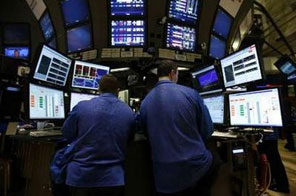Asian stocks lower after China data; Europe gains
HONG KONG: Most Asian stock markets dropped Thursday after China's economy surged last quarter, adding to worries about Beijing's ability to prevent overheating without derailing the recovery. European markets opened higher.
Asia's weaker trade followed sharp losses on Wall Street. The dollar gained against the yen and euro while oil prices fell after trading higher most of the day.
China, declaring itself the first country to recover from the global crisis, said its economy grew 10.7 percent in the fourth quarter and 8.7 percent for all of 2009, blowing away forecasts.
The dizzying growth, along with government figures showing inflation on the rise, means China is likely to take additional measures rein in bank lending and remove extra money from the system to help cool the economy.
Analysts said uncertainties about what precise steps China will take and when to keep its economy from overheating weighed on investors. Beijing's policymakers have yet to telegraph clear plans for handling challenges like asset bubbles, inflation and the country's currency.
"Investors are concerned about how China is going to deal with the situation. The bottom line is they don't know what to expect and what the effects will be on the economy and the region," said Thomas Lam, group chief economist at financial services firm OSK-DMG in Singapore.
As trading started in Europe, Britain's FTSE 100 was up 0.2 percent, Germany's DAX added 0.3 percent and France's CAC-40 gained 0.5 percent. U.S. futures pointed to a lackluster open on Wall Street. S&P futures were up 0.9 point, or 0.1 percent, at 1,134.90.
Hong Kong led Asia's declines, with the Hang Seng falling 423.50 points, or 2 percent, to 20,862.67. India's market dropped 2.1 percent, Taiwan's index fell 1.1 percent and Australia's benchmark lost 0.8 percent. Singapore's market slid 1.4 percent.
Bucking the region's declines was Japan, where the Nikkei 225 stock average rose 130.89, or 1.2 percent, to 10,868.41 on gains in technology stocks. South Korea's Kospi was up 0.5 percent.
In China, Shanghai's benchmark recouped losses to close up 7.01 points, or 0.2 percent, to 3,158.86.
China' fast-growing economy has helped lead the world out of recession, so many investors are trying to gauge the degree of support it can provide in the next year. According to a World Bank report Thursday, global economic growth may wilt later this year as stimulus spending fades.
Beijing's next steps were a source of speculation Thursday. Rising inflation could lead the government to raise interest rates as early as March, analysts at Capital Economics said in a report.
Others said the government would act slowly through other means, like increasing the amount of reserves banks must keep on hand and targeting aggressive lenders. Dong Tao, regional economist at Credit Suisse in Hong Kong, expected China's moves would be "tentative and gradual" without higher interest rates until the U.S. starting raising rates or China's inflation jumped to 3 percent or more.
Disappointing corporate results in the U.S. contributed to a steep fall on Wall Street overnight.
The Dow fell 122.28, or 1.1 percent, to 10,603.15, its biggest point loss since Dec. 17 and its biggest percentage drop since Dec. 31. The Dow had been down as much as 208 points.
The broader S&P 500 index fell 12.19, or 1.1 percent, to 1,138.04, and the Nasdaq composite index fell 29.15, or 1.3 percent, to 2,291.25.
Oil prices fell in late Asia trade, with benchmark crude for March delivery down 35 cents to $77.40 a barrel. The contract fell $1.58 to settle at $77.74 on Wednesday.
The February contract expired Wednesday, ending down $1.40 at $77.62.
The dollar strengthened to 91.60 yen from 91.22 yen. The euro was lower at $1.4055 from $1.4104.






